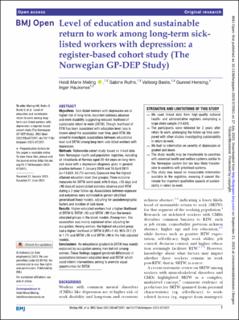| dc.contributor.author | Meling, Heidi Marie Kirkeng | |
| dc.contributor.author | Ruths, Sabine | |
| dc.contributor.author | Baste, Valborg | |
| dc.contributor.author | Hensing, Gunnel | |
| dc.contributor.author | Haukenes, Inger | |
| dc.date.accessioned | 2023-09-27T10:49:24Z | |
| dc.date.available | 2023-09-27T10:49:24Z | |
| dc.date.created | 2023-09-20T13:02:34Z | |
| dc.date.issued | 2023 | |
| dc.identifier.issn | 2044-6055 | |
| dc.identifier.uri | https://hdl.handle.net/11250/3092348 | |
| dc.description.abstract | Objectives Sick-listed workers with depression are at higher risk of long-term, recurrent sickness absence and work disability, suggesting reduced likelihood of sustainable return to work (SRTW). Though likelihood of RTW has been associated with education level, less is known about the association over time, post-RTW. We aimed to investigate associations between educational level and SRTW among long-term sick-listed workers with depression.
Methods Nationwide cohort study, based on linked data from Norwegian health and population registries, including all inhabitants of Norway aged 20–64 years on long-term sick leave with a depression diagnosis given in general practice between 1 January 2009 and 10 April 2011 (n=13.624, 63.7% women). Exposure was the highest attained education level (five groups). Three outcome measures for SRTW were used, with 0 days, ≤30 days and ≤90 days of accumulated sickness absence post-RTW during a 2-year follow-up. Associations between exposure and outcomes were estimated in gender-stratified generalised linear models, adjusting for sociodemographic factors and duration of sick leave.
Results Higher-educated workers had a higher likelihood of SRTW 0, SRTW ≤30 and SRTW ≤90 than the lowest-educated groups in the crude models. Among men, this association was mainly explained when adjusting for occupation. Among women, the highest educated group had a higher likelihood of SRTW 0 (RR=1.45, 95% CI 1.23 to 1.71) and SRTW ≤30 and SRTW ≤90 in the fully adjusted models.
Conclusions An educational gradient in SRTW was mainly explained by occupation among men but not among women. These findings suggest gendered differences in associations between education level and SRTW, which could inform interventions aiming to promote equal opportunities for SRTW. | en_US |
| dc.language.iso | eng | en_US |
| dc.publisher | BMJ | en_US |
| dc.rights | Navngivelse-Ikkekommersiell 4.0 Internasjonal | * |
| dc.rights.uri | http://creativecommons.org/licenses/by-nc/4.0/deed.no | * |
| dc.title | Level of education and sustainable return to work among long-term sick-listed workers with depression: a register-based cohort study (The Norwegian GP-DEP Study) | en_US |
| dc.type | Journal article | en_US |
| dc.type | Peer reviewed | en_US |
| dc.description.version | publishedVersion | en_US |
| dc.rights.holder | Copyright 2023 The Author(s) | en_US |
| dc.source.articlenumber | e072051 | en_US |
| cristin.ispublished | true | |
| cristin.fulltext | original | |
| cristin.qualitycode | 1 | |
| dc.identifier.doi | 10.1136/bmjopen-2023-072051 | |
| dc.identifier.cristin | 2177067 | |
| dc.source.journal | BMJ Open | en_US |
| dc.identifier.citation | BMJ Open. 2023, 13 (7), e072051. | en_US |
| dc.source.volume | 13 | en_US |
| dc.source.issue | 7 | en_US |

